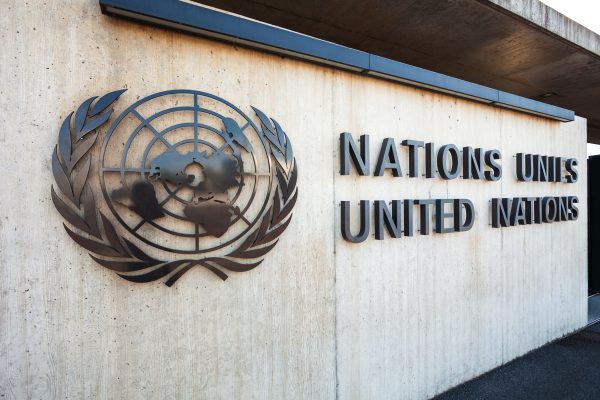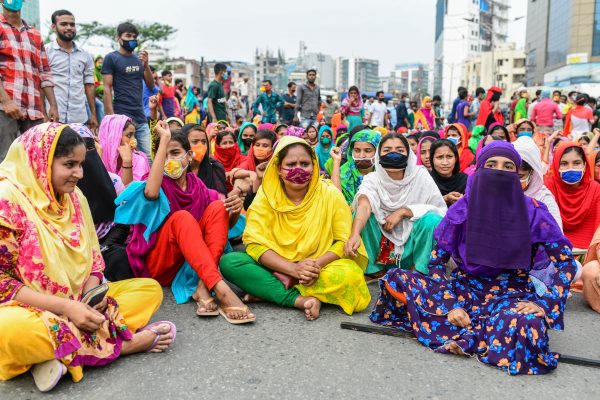This website uses cookies so that we can provide you with the best user experience possible. Cookie information is stored in your browser and performs functions such as recognising you when you return to our website and helping our team to understand which sections of the website you find most interesting and useful.

By the fourth day of the UN Treaty negotiations, it was clear that COVID-19 had taken a toll on states’ participation. It’s still too early to tell what the outcome of this year’s negotiations will be, as more work lies ahead in bridging the remaining divisions, but the discussions were – for the most part – constructive and lively. As the stakes couldn’t be higher, states were urged to remain active through written and verbal contributions by the Global Alliance of National Human Rights Institutions (NHRIs), the International Trade Union Confederation (ITUC), and several civil society organisations.
The EU kicked off the morning session with a question: Does mutual legal assistance in international judicial cooperation cover cooperation in both civil and criminal matters? Disappointingly, yet unsurprisingly, this was the EU delegation’s only intervention of the day.
Mutual legal assistance
On mutual legal assistance provisions (article 12), Brazil remarked that the article places a disproportionate burden on states. Russia went next, arguing that it would be important to have the broadest possible set of grounds where recognition and enforcement of court decisions could be refused. China’s concerns about the judicial sovereignty of states were followed by two recommendations: a) the draft text should clearly distinguish between judicial assistance in civil and criminal litigation; and b) the draft text should rely on existing bilateral and multilateral treaties or agreements as the basis for judicial cooperation. The International Chamber of Commerce argued that provisions in this article could lead to “politically-motivated actions against companies”.
Ecuador: more detail on access to justice and remedy needed
Ecuador led a group of supportive states, urging for more details on access to justice and remedy for victims. The delegate also asked participants to look to the Inter-American Court of Human Rights for an example of interim measures of mutual legal assistance. Armenia only suggested adding a reference to the protection of personal data, while Panama submitted that any state, which is not a party to this legally binding instrument, should nevertheless also provide mutual legal assistance and international judicial cooperation on the basis of an ad hoc arrangement.
Role of National Human Rights Institutions
National Human Rights Institutions welcomed the role foreseen for them in article 12.2, affirming that they are well suited to serve as the national implementation mechanism, as well as to monitor implementation and compliance. Moreover, they requested that states provide the resources needed to fulfil this function, as is the case with other conventions, such as the Convention on the Rights of Persons with Disabilities.
Egypt submits new paragraph
Egypt submitted a new paragraph under article 13.2: “Ensuring that any business activities undertaken by trans-national corporations and other business enterprises domiciled in or operating on their territory, or under their jurisdiction or control, do not deprive another state party of the ability to realise the human rights of persons within its jurisdiction.”
Heated debate on international law
Article 14 on consistency with international law, principles and instruments sparked a heated debate among the delegates. First, Brazil asked why trade and investment agreements are even mentioned in this article. Russia tagged along by requesting the Chair to either enumerate all principles of international law or refrain from singling out any one principle, such as state obligations in trade and investment. Echoing statements made on the first day of the negotiations, China emphasised the need to balance human rights and the right to development.
Palestine recommended strengthening the language to ensure that existing trade and investment agreements comply with provisions of the draft Treaty, while Chile suggested that provisions in this instrument should supersede those in trade agreements. Ecuador struck a conciliatory tone, arguing that the spirit of this article calls for compatibility rather than hierarchy. Azerbaijan joined the discussion to welcome the principles of sovereign equality, territorial integrity, and non-intervention in domestic affairs, as well as to applaud article 14.5, which encourages the revision of all international agreements to ensure compliance with this Treaty. Finally, Panama asked for the inclusion of an obligation for states to develop public policies that are in line with this legally binding instrument, and which should go beyond simply prevention of human rights violations.
Some states like Mexico, Palestine, Chile, Azerbaijan, and Panama emphasised the importance of including jus cogens rights, as this will ensure a balance between the state obligation to respect, protect and guarantee human rights and their commitments in trade investment agreements – a recommendation broadly welcomed by participating civil society organisations.
What about the costs?
Talks continued with some states requesting a cost estimation for the creation of a new human rights treaty-based committee, the organisation of a biennial conference of state parties, and the management of a fund to support victims (article 15). Brazil, China and the Russian Federation even questioned the need for such institutional arrangements, which they described as “excessive” and overlapping with the functions of the UN Conference on Trade and Development, the UN Committee on Economic, Social and Cultural Rights, and the UN Human Rights Council. They requested additional information from the drafters on where the funds for these arrangements would come from and who would make decisions on how they are used.
Regarding the procedure for appointing and electing members to the proposed committee, both the Russian Federation and Namibia shared their concerns, but their positions on the matter could not diverge more. While the Russian delegate intended to undermine the committee’s establishment entirely, Namibia agreed with Panama that it needs have teeth to ensure state compliance with the Treaty.
Civil society and trade unions step in
Civil society organisations jumped in to recommend the inclusion of an additional protocol on complaint mechanisms and the establishment of international monitoring centre on trans-national corporations to support the committee’s work.
ITUC also took the floor to request that the proposed committee should have the ability to hear individual complaints, and that trade unions and civil society should be able to participate in the election of experts to the committee.
Given that the idea for an international tribunal was scrapped from Treaty text, ITUC voiced its disappointment with the loss of an independent judicial forum for affected people to access justice for human rights violations, as well as an additional compliance mechanism, complementary to the proposed committee.
As COVID-19 restrictions intensify, uncertainty looms over the remaining negotiations and conclusions on the last day of the session. What is already clear at this stage, is that more work is needed to bridge remaining divisions and find compromises that would lead to an eventual third draft of the Treaty.












